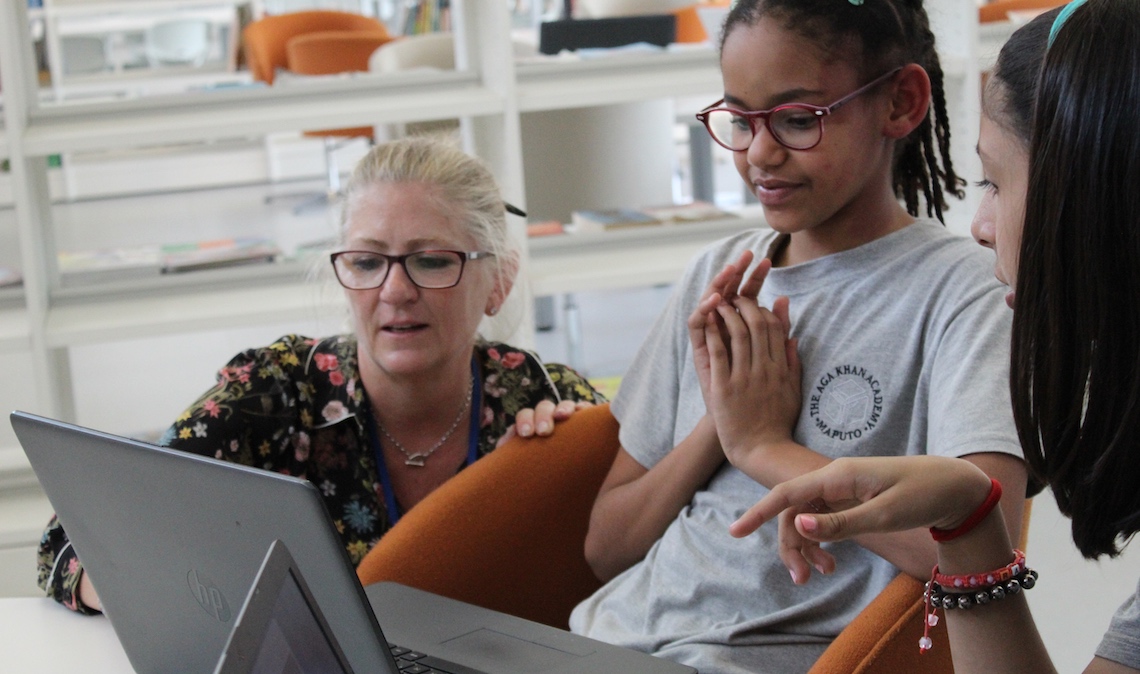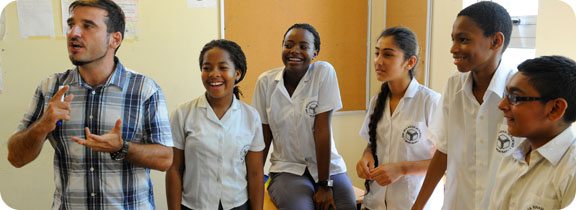
Middle Years Programme
The Aga Khan Academy Mombasa is authorised by the International Baccalaureate (IB) to offer the Middle Years Programme (MYP) for students in years 6–10.
The Academy is the only school in Mombasa and one of two in Kenya to offer the full range of IB programmes from year 1 to university entrance. We offer the IB Middle Years Programme as part of an integrated curriculum that includes the Primary Years Programme (years 1–5) and the Diploma Programme (years 11–12).
The MYP covers a study of the major disciplines, including:
- Languages
- Sciences
- Literature
- Social sciences
- Mathematics
- Arts
- Technology
- Physical education
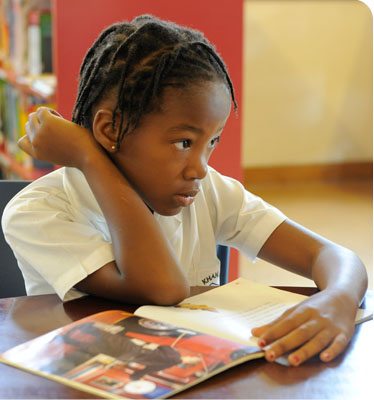
The five Aga Khan Curricular Strands, which are unique to the Aga Khan Academies, are integrated throughout the curriculum.
Learning through the MYP
Our MYP students are immersed in a challenging and enriching educational environment. We ensure that they master basic skills, develop the ability to analyse and think critically, and become computer literate. We also emphasise the development of self-discipline and good work habits.
The programme encourages students to reflect on their learning and make connections with real world issues. It also helps students develop an awareness of their thought processes and learning strategies, and of how they learn best.
The MYP includes a service component that makes students aware of community and global needs. We also ensure that each student receives a strong leadership experience and grounding in ethics, which helps prepare them for future leadership roles. The final performance of our MYP students is assessed by teams of teachers and is validated by the IB through a monitoring process that ensures the high standards of IB schools worldwide.
For further information about applying to the MYP, please see the admission requirements or contact us.
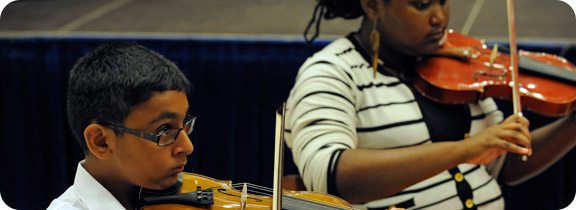
Enrichment Programmes
Enrichment programmes enable students to realise their potential in a variety of settings beyond the classroom. Students develop a sense of self-awareness and an understanding of school and community needs and opportunities. They also learn how to apply their gifts and skills to make a positive impact.
At the Academy, we believe in a balanced, rounded, comprehensive school experience. As this includes both academic and co-curricular experiences, we encourage our students to do their best both in and outside the classroom.
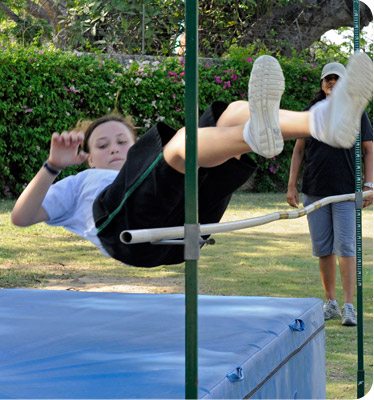 We offer outstanding sports facilities that include:
We offer outstanding sports facilities that include:
- Swimming and diving pools
- Cricket, soccer and hockey pitches
- Basketball and volleyball areas
- Tennis and squash courts
- Dance studio
- Gymnasium
- Athletics tracks
Children with special sporting gifts will be encouraged to develop their talents in every way. Children with special gifts in music, art or drama will similarly be encouraged through opportunities to practise and perform while at the Academy.
Our enrichment programmes are clustered into three main streams, each with a different focus:
Expression
Whether through visual or performing arts, this cluster engages students to think creatively and express their identities and thoughts aesthetically. Through theatre, art, music and drama, students learn to work together and infuse their projects with values and lessons from other parts of their schooling. Individual and collaborative creative projects emphasise growth and development through personal challenge, ultimately resulting in achievable personal goals.
Action
The student as a reflective practitioner is a basic tenet of the action cluster. Through physical sport, both competitive and non-competitive, students are challenged in their physical growth, and learn values such as good sportsmanship, teamwork and ethical behaviour. We encourage them to extend themselves by trying different activities and working with teammates to pass on their knowledge. In line with developing the student as a whole, a healthy lifestyle complements and enhances academic achievement.
Citizenship
At the Academy, we encourage knowledge and understanding of humanity and civil society. Through their involvement in citizenship activities, students gain an understanding of the practical implications of their work and study. By collaborating with community groups on sustainable projects, they develop an appreciation for human rights, human dignity and of how their actions impact the world around them.
To learn more about the Academy's programme, please visit the Academic Programme page.
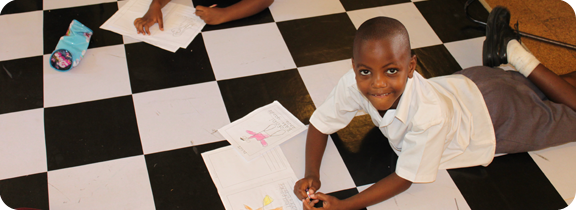
Primary Years Programme
The Junior School of the Aga Khan Academy, Dar-es-Salaam is preparing for authorisation as an International Baccalaureate (IB) World School offering the IB Primary Years Programme (PYP).
Foundations for Lifelong Learning
The Primary Years Programme focuses on the development of the whole child. It is geared towards creating independent, confident and respectful learners.
Our classroom curriculum and after-school activities address the children's social, physical, cultural and ethical development while giving them a strong foundation in all the major areas of knowledge.
 The curriculum consists of five essential elements:
The curriculum consists of five essential elements:
- concepts
- knowledge
- skills
- attitude
- action.
The core subjects we cover include English language, mathematics, social studies, science and technology. Our programme also includes a beginning computing course, physical education, music, art, French and Portuguese.
Students and teachers explore questions in all subject areas using an interactive, student-centered approach. The knowledge element of the curriculum is enhanced by six themes that are studied across the various subject disciplines. These are:
- who we are
- where we are in place and time
- how we express ourselves
- how the world works
- how we organise ourselves
- sharing the planet.
The PYP develops well-rounded students who are well versed in all areas of knowledge. They learn to be intellectually curious, principled, caring, open-minded, well balanced and reflective learners.
Please visit the Admission Requirements page or contact us to find out more about applying to the PYP at the Academy.
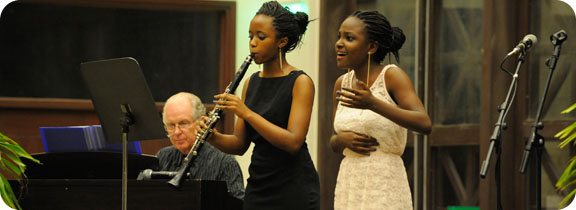
Student Projects
"What students know is no longer the most important measure of an education. The true test is the ability of students and graduates to engage with what they do not know, and to work out a solution."
– His Highness the Aga Khan
Our goal is to instil in each student the desire to acquire knowledge as part of a balanced, lifelong process of inquiry. This, in turn, leads to their intellectual and personal growth.
In addition to mastering core subjects, our students acquire the skills, worldview, integrity and confidence to adapt to new challenges. To help students develop these skills, we encourage them to pursue projects in their classrooms based on sound inquiry, careful analysis and informed research.
Practical problem solving
We offer Product Design as well as Digital Design within the umbrella of Design as prescribed by the International Baccalaureate Middle Years Programme. These courses are designed to teach students the skill of problem solving, both real and perceived. In the early years, a guided approach is used with more or less generic solutions. In later years, students explore possibilities based on the needs of clients and emergent target reach. As part of the requirements, students create a physical solution while taking into consideration the properties of the materials they employ.
Students follow a problem-solving process, which includes:
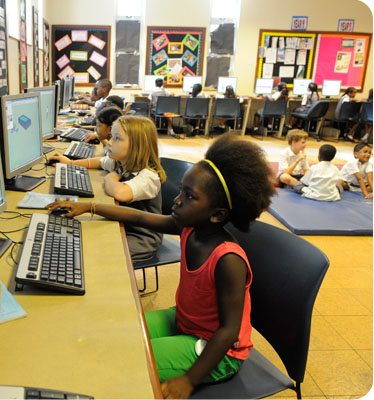
- Analysing the problem
- Designing a solution and producing specifications of a product to address the need
- Developing various designs and rating them based on the specifications
- Developing and implementing a plan for production of the design selected
- Evaluating the product for use and functionality
Students are also expected to provide supporting written documentation.
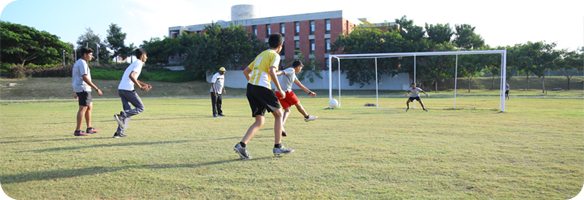
Enrichment Programme
Enrichment programmes enable students to realise their potential in a variety of settings beyond the classroom. Students develop a sense of self-awareness and an understanding of school and community needs and opportunities. They also learn how to apply their gifts and skills to make a positive impact.
At the Academy, we believe in a balanced, rounded, comprehensive school experience. As this includes both academic and co-curricular experiences, we encourage our students to do their best both in and outside the classroom.
 We will offer outstanding sports facilities that will include swimming and diving pools and playing fields for a wide variety of sports and athletics.
We will offer outstanding sports facilities that will include swimming and diving pools and playing fields for a wide variety of sports and athletics.
Children with special sporting gifts will be encouraged to develop their talents in every way. Children with special gifts in music, art or drama will similarly be encouraged through opportunities to practise and perform while at the Academy.
Our enrichment programmes are clustered into three main streams, each with a different focus:
Expression
Whether through visual or performing arts, this cluster engages students to think creatively and express their identities and thoughts aesthetically. Through theatre, art, music and drama, students learn to work together and infuse their projects with values and lessons from other parts of their schooling. Individual and collaborative creative projects emphasise growth and development through personal challenge, ultimately resulting in achievable personal goals.
Action
The student as a reflective practitioner is a basic tenet of the action cluster. Through physical sport, both competitive and non-competitive, students are challenged in their physical growth, and learn values such as good sportsmanship, teamwork and ethical behaviour. We encourage them to extend themselves by trying different activities and working with teammates to pass on their knowledge. In line with developing the student as a whole, a healthy lifestyle complements and enhances academic achievement.
Citizenship
At the Academy, we encourage knowledge and understanding of humanity and civil society. Through their involvement in citizenship activities, students gain an understanding of the practical implications of their work and study. By collaborating with community groups on sustainable projects, they develop an appreciation for human rights, human dignity and of how their actions impact the world around them.
To learn more about the Academy's programme, please visit the Academic Programme page.
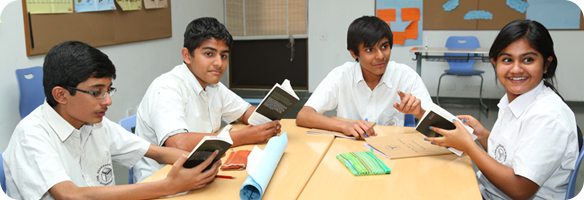
Middle Years Programme
The Aga Khan Academy Dhaka is an authorised International Baccalaureate (IB) World School offering the Middle Years Programme (MYP).Our MYP curriculum for students in Grades 6-10 is part of an integrated curriculum that forms a continuum from the Primary Years Programme (Grades 1-5) to the Diploma Programme (Grades 11-12).
Students study a broad and balanced range of disciplines, including:
- Languages;
- Literature;
- Sciences;
- Social sciences;
- Mathematics;
- Ats;
- Technology; and
- Physical education.
The five Aga Khan Curricular Strands, which are unique to the Aga Khan Academies, are integrated throughout the curriculum.
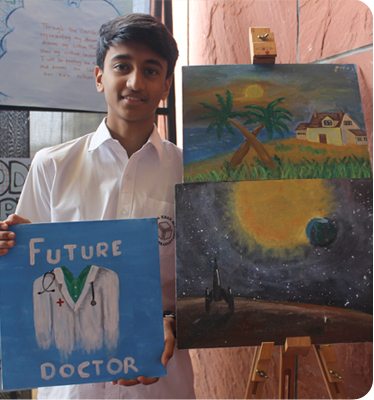 Learning in the middle years
Learning in the middle years
Our MYP students are immersed in a challenging and enriching educational environment. We ensure they master basic skills, develop the ability to analyse and think critically and become computer literate. We also emphasise the development of self-discipline and good work habits.
The programme encourages students to reflect on their learning and make connections with real-world issues. It also helps students develop an awareness of their thought processes and learning strategies, and of how they learn best.
The curriculum includes a service component that makes students aware of community and global needs. We also ensure that each student has a strong leadership experience and receives grounding in ethics, which helps prepare them for future leadership roles.
For further information about applying to Grades 6-10 at the Academy, please see the admission requirements.
Rebecca Nichols: Seeing Endless Possibilities for the Future of AKA Maputo
Engaging Students to Become Stake-Holders in the Future of the Academy
For the Middle Years Programme (MYP) Coordinator, Rebecca Nichols, the sky is the limit when envisaging the future of the Aga Khan Academy in Maputo, Mozambique. More importantly, in her eyes, how the Academy keeps growing, shaping and expanding its role in the country and beyond must lie in the hands of students.
“I would like to see our students take responsibility for what our school should become,” she states with excitement, squarely placing the emphasis on student-centred leadership. “I look forward to hearing their ideas for new initiatives, and I look forward to AKA Maputo becoming a school on the African continent from which leaders emerge,” she adds with resolute clarity.
Listening to the details of Rebecca’s background, education, and experience is highly entrancing. Born in the United Kingdom, she spent the early years of her life in Kenya before moving to the Ashanti Goldfields in Ghana for a few years and then back to Great Britain where she obtained her university-level education.
Armed with Master’s Degree in Education from the University of Bath and a post-graduate certificate in Education from the University of Sheffield, Rebecca has taught schools in Portugal, Angola, Kenya, Sweden, Spain, Italy and Hong Kong. In addition, she has worked as an International Baccalaureate (IB) Diploma examiner, an MYP workshop leader and an independent educational consultant for schools in various parts of the world. She is currently pursuing a Doctorate Degree in Education. A British citizen, Rebecca says of her background, I think of myself as a transcultural, rather than someone who identifies particularly with the UK.”
The Academy’s IB Programme is rich in Curricular Strands of ethics, pluralism, economics for development, cultures, governance, and civil society. These play a vital role in Rebecca’s teaching as she incorporates them in her instruction.
“I teach English language and literature and am always able to explore texts and language through the lens of the IB Programme’s Curricular strands,” she notes. “Currently, some of my grade 6 and grade 7 students and are studying Shakespeare’s ‘The Tempest,” and we have explored the themes of governance and civil society in the play.”
Mutual respect and mutual trust between students and also between students and teachers are of paramount value for a thriving classroom. How does Rebecca ensure that this environment exists in her classroom?
“By listening to one another. By supporting one another. By helping one another reach their potential.”
Recognising the importance the Academy attaches to incorporating pluralism and the one-family feeling in the school, Rebecca states of the teachers, “We do a lot of work on team- building activities and also try to engage our students in undertakings that will enable them to develop a sense of community, a sense of family.”
Students, too, participate in this responsibility of developing a sense of belonging. “Our students have set up an after-school programme called “Teen Talks” that enables them to discuss their feelings, experiences and, concerns,” Rebecca says. “Their openness to one another ensures that a climate of pluralism flourishes within the Academy.”
Although Rebecca values her students and works hard to educate them, she feels an excellent education must involve parents. “Any outstanding education must involve three parties; the students, the parents/guardians and the teachers,” Rebecca is quick to note. “I communicate a lot with parents through monthly coffee mornings, emails and events to which parents are invited. I especially look forward to the parent-teacher conferences.”
Radiating ambition for her students to become independent thinkers, even while working in groups, Rebecca designs projects that foster independent thinking skills.
“I create exciting, relevant units of work that expose them to a range of language and literature from a variety of contexts,” she states. I encourage them to be creative, to work independently, in pairs and as part of a group. I provide detailed feedback and expect students to be able to provide meaningful feedback to one another,” she pauses. And then continues, “I encourage them to take risks, to read widely and to learn about the world beyond our campus fences. I encourage them to try things they have never done before.”
Cherishing her time at the Academy, Rebecca feels the experience she is acquiring will continue to resonate with her throughout her life. “Working at the Academy has enabled me to become a more effective multitasker who is willing and able to take on a wide variety of roles that support teaching and learning,” she muses. “I believe that this is an exciting time for the Academy and look forward to being part of the journey.”
University Acceptances 2014
Members of the first graduating class of the Aga Khan Academy, Hyderabad were accepted by the following universities in 2014:
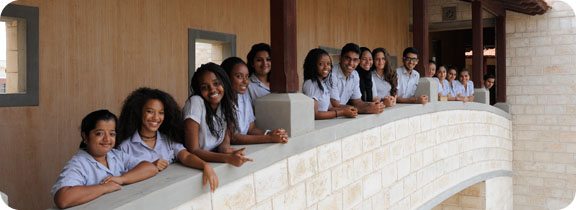
Bridging Global and Local
The Aga Khan Academies provide a globally relevant education, notably through the Aga Khan Curricular Strands (AK Strands), co-curricular offerings and student life. Students are exposed to global themes that emerge from the local context within which students live and learn.
The curriculum is based on the International Baccalaureate (IB) programme, and the overall Academies educational programme is aimed at developing students with strong leadership potential.
The AK Strands focus on globally applicable concepts such as pluralism and global economics. Students are also instructed in English and a local language in all Academies.
Academy students will be expected to spend time on another Academy campus during their secondary school years, thus providing them an immersion experience in a different culture.
The shared IB curriculum enables student and teacher exchanges between Academies.
"A great school, will educate its students not merely to be personally successful but also to use their gifts to build their communities and enhance the common good to levels beyond our dreams."
IB Policies
These policies are mandated by the International Baccalaureate and guide the work we do at the Academy to implement the IB programme standards and practices.
Academic Integrity is a principle in education and a choice to act in a responsible way so others can trust us. It means conducting all aspects of academic life in a responsible and ethical manner. The policy details how we support this. Download the Academic Integrity Policy here.
The Admissions Policy outlines our requirements, expecttations, assessment and processes for students who wish to join the Academy. Download the Admissions Policy here.
